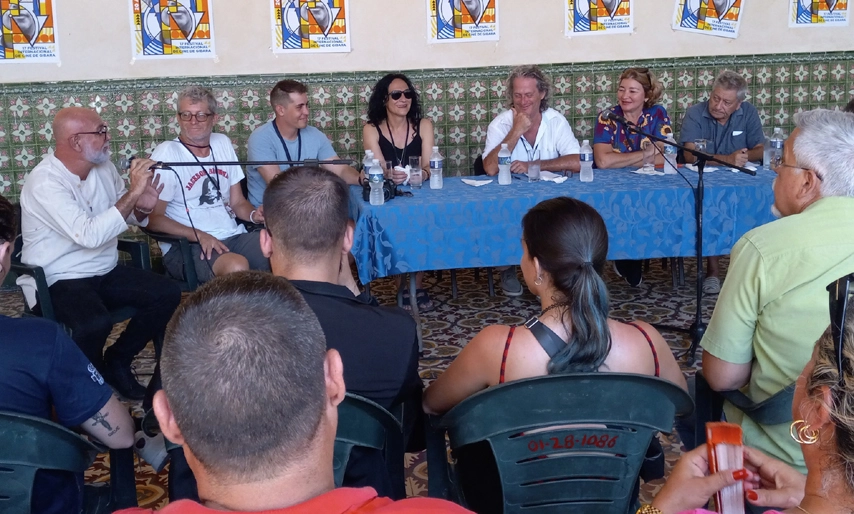The “Preservation of heritage and cultural values through films” was the workshop that brought together historians, photographers, filmmakers and international guests on the fourth day of the Gibara International Film Festival at the Casa de Cultura of this city in the province of Holguin.
The panel was attended by Alberto Mora, Historian of Gibara; Evelyn Hernández Cobas, Provincial Director of Heritage; Casey Stoll, photographer; filmmakers Isthar Yasin and Kiki Álvarez; Xavier D’Arthuys and Milena Fiore specialists in film restoration and Sergio Benvenuto Solás as moderator.
Heritage Conservation
The importance of recovering and conserving heritage, movable and immovable, natural, artistic, tangible and intangible in terms of cultural and social enrichment was addressed; and it was discussed from the perspective that heritage should not be seen as a museum object or alien, but as the living memory that is part of the fabric of society.
Alberto Mora, Historian of Gibara, spoke about the imprint of the Villa Blanca through its architecture and culinary art in the Cuban cultural panorama thanks to the cinema and this Festival, a dynamizer of culture that makes its heritage visible.
The very conformation of Gibara, he said, of its urbanism in consonance with the bay and the sea gives it a cinematographic illumination that has earned it the position of the most filmed and photographed city in Cuba, after Havana. It is part of the network of heritage cities and has cinema as a city brand.
Workshop, heritage at Gibara Film Festival
Evelyn Hernández, a specialist in heritage, pointed out that it is necessary to continue promoting projects focused on nature, since the area is part of an important migratory corridor and has natural areas of high heritage value. She also highlighted how the Festival has boosted the restoration of hotels, museums and the urban center of the town.
Historical memory from the cinema
Xavier D’Arthuys spoke about his role and challenges in the restoration of the Latin American ICAIC Newsreel directed by Santiago Alvarez, a French-Cuban collaboration aimed at preserving this audiovisual legacy, considered Intangible Heritage of Humanity by UNESCO.
The French National Audiovisual Institute was in charge of restoring the 1,424 editions of the film, the originals of which are preserved in Cuba and copies are available on the institution’s website, but he stressed that “… restoring is good, preserving is magnificent… but it needs to be disseminated, showing this heritage is a necessity…”.
While the Italian Milena Fiore delved into the work of the Audiovisual Archive of the Labor and Democratic Movement, an institution created by intellectuals affiliated to the Italian Communist Party in order to preserve the historical memory of that country.
In Kiki Alvarez’s intervention, it transcended that “restoration is not complete until the collective existence of being seen in a movie theater is experienced”. She also pointed out the need to rescue movie theaters in order to motivate people to go to the movies.
In this sense, Sergio Benvenuto pointed out that it is a priority of the ICAIC to achieve the equipment so that the Cine Jibá can have screenings throughout the year. He also acknowledged the conservation of the home of the most universal Gibareño, Guillermo Cabrera Infante. “First we must worry about preserving history and then we will take care of interpreting it.”
Promotion of identity values
Costa Rican filmmaker of Iraqi descent Ishtar Yasin commented on the preservation of the memory of peoples from the experience of her documentary “My Lost Country”, presented at the Festival, a story precisely about the recovery of Iraqi cultural heritage from a decolonizing perspective.
Casey Stoll spoke about the importance of photography to document life and its context. Casey has been relevant in the documentation of different moments of the Festival and his work shows the evolution of this event.
The panel culminated with an intense brainstorming session in which several participants contributed different points of view and suggested projects for the rescue of historical memory through film, an indispensable medium in the preservation of moments of life that could be lost in different situations.
- Holguin workers parade on May Day celebration - 1 de May de 2024
- Jibarama 2024 Environmental Film Festival begins in Gibara - 24 de April de 2024
- Holguin says stop genocide in Palestine (+Photos) - 2 de March de 2024

